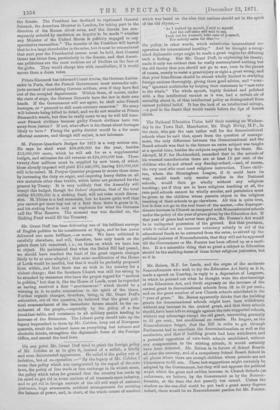The National Education Union held their meeting on Wednes- day
in the Town Hall, Manchester, Mr. Hugh Birley, M.1'., in the chair, who put the case rather well for the denominational schools when he said that, apart from the question of manage- ment, the only difference between the Denominational and the Board schools was that in the former an extra subject was taught at a special time, besides the subjects required by the State. Mr. Akroyd, M.P. for Huddersfield, remarked that in the schools of his worsted manufactories there are at least 15 per cent. of the children who do not attend any Sunday-school,—and, of course, the very ones who most need religious instruction. These child- ren, whom the Birmingham League, if it could have its way, would teach only secular studies in the National schools, would then go wholly without any religious teaching ; yet if they are to have religious teaching at all, the rate-paid schools cannot be wholly secular, and permission must be given to the children whose parents object to the religious teaching of their schools to go elsewhere. All this is quite true, but it does not go to the real heart of the matter,—the dispropor- tionate increase in Church as compared with Nonconformist schools under the policy of the year of grace given by the Education Act. If that year of grace had never been given, Mr. Forster's Act would be in undisputed possession of the ground. But that provision, while it called out an immense voluntary subsidy in aid of the educational funds to be extracted from the rates, so stirred up the political jealousy of Nonconformists, that they will not be appeased till the Government or Mr. Forster has been offered up as a sacri- fice. It is a miserable thing that so great a subject as Education should be the stalking-horse of these bitter religious jealousies, but so it is.










































 Previous page
Previous page